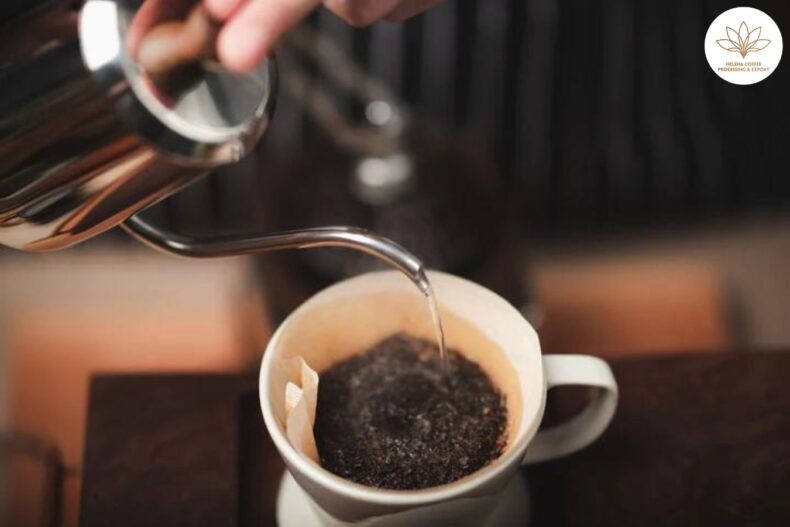
Water specifically for coffee brewing: Water is the lifeblood of great coffee – ask any barista or café owner. It accounts for nearly all a cup’s volume, profoundly shaping flavor. So specialty “coffee waters” designed to extract maximum taste make sense. But with so many tailored brewing waters saturating the market, are they still enhancing the cup or just capitalizing on hype?
The latest is DesignerWater – a Danish collaboration between coffee pros like Espresso House founder Kenneth Luciani and the University of Copenhagen. But according to coffee water expert Maxwell Dashwood of Helena Coffee, the value to average drinkers is questionable. While promising for enthusiasts, for most casual coffee fans, the difference may be imperceptible. The proof is in the sip – a high price tag alone can’t buy quality. Only a refined palate can truly assess whether these brewing waters unlock a cup’s full potential or merely represent marketing overhype. In the end, the value depends on your tastebuds.
THE OBSESSION OF SPECIALTY COFFEE WITH THE QUEST FOR THE IDEAL BREWING WATER
Within the coffee industry, the profound influence of water quality and hardness on the ultimate cup’s excellence is a well-established fact, extensively examined over time. Despite the exhaustive exploration of this topic, numerous coffee professionals and enthusiasts continue their quest for the most efficient methods of treating and filtering water for coffee brewing.
Maxwell, a three-time UK Barista Champion and WBC finalist, co-authored the book “Water for Coffee,” delving into the scientific aspects of water and its impact on coffee. He emphasizes the crucial role water plays in the industry today, manifesting in the emergence of new products and a heightened focus on water in educational materials such as books and online courses.
In a landscape already populated by noteworthy products like the Peak Water filter jug, Third Wave Water mineral packets, and reverse osmosis (RO) systems, the options continue to expand. The latest addition is DesignerWater, a bottled water brand set to launch officially in 2024. Utilizing patent-pending RO systems, the company enhances coffee flavors by adding optimal levels of salt and minerals.

“The industry’s dedication to coffee quality, skills, and equipment naturally directs attention to the most voluminous ingredient—water,” notes the DesignerWater team. Their research with the University of Copenhagen promises improved taste, easier equipment maintenance, and potentially prolonged equipment lifespan.
However, amidst the plethora of water filtration systems and ready-to-use solutions, determining the best choice becomes a challenge. With numerous factors at play, including cost, functionality, and convenience, the decision depends not only on the quality and hardness of the original water source but also on individual preferences and circumstances.
Maxwell, reflecting on the evolution of water treatment practices, points out that solutions involving deionized and demineralized water with added mineral salts offer a high degree of control. Yet, he acknowledges a growing trend of excessive mineral salt usage, cautioning that it may compromise taste. Nevertheless, for those residing in areas with subpar water sources, adding mineral salts remains a viable solution, providing much-needed control over the brewing process.
A PASSING FAD OR A PERMANENT FIXTURE?
There’s no denying that the industry’s preoccupation with water for coffee is not just a passing phase; it is poised to persist and likely intensify in the future.

Maxwell affirms this trajectory, observing a growing number of individuals venturing into this realm. From a consumer perspective, the complexity surrounding water remains intriguing, with significant confusion prevailing. However, there is a noticeable surge in awareness as more people actively engage in refining their understanding of water quality.
“The exploration of water’s role is gaining traction, and awareness is pivotal,” Maxwell notes. The demand for water-related products is evident, extending beyond the realm of baristas and coffee enthusiasts to encompass a broader audience of mainstream coffee consumers.
Simultaneously, it becomes imperative to discern which water filtration systems and ready-to-use solutions truly contribute substantial value to the industry. The answer, to a large extent, is subjective, contingent on the baseline quality of the water in question.
THE QUEST PERSISTS
Even with his extensive expertise, Maxwell underscores the ongoing need for further exploration into the intricacies of water for coffee brewing and the identification of optimal choices.
“As an industry, there’s a continuous effort to deepen our comprehension of water’s role in coffee brewing. Anticipate witnessing the emergence of more products, each vying for effectiveness with consumers,” he remarks. “A prevalent trend involves the inventive repackaging of mineral salts, whether in their natural state or concentrated forms.”
Maxwell recognizes that the interplay between water and coffee holds more mysteries to unravel. Bicarbonate’s significance is well-established, with its control exerting the most substantial influence on the coffee’s flavor profile. The acknowledgment of other essential minerals, notably calcium and magnesium, prompts ongoing endeavors to exercise greater control over their presence.
“While strides have been made in understanding these elements, the quest for a convenient water solution that not only proves effective but also yields the best-tasting coffee persists,” he concludes. “In the current landscape, it remains uncertain if anyone has successfully achieved this elusive goal.”
Ultimately, crafting the ideal water for coffee brewing may not have a universally applicable solution. In light of this, taking a thoughtful approach to explore your options and gaining insight into the origin of your water becomes an essential initial undertaking.
While the intricacies of water optimization for coffee may seem complex, mastering the art can open the door to an entirely new realm of flavor possibilities.
FAQS:
- The Influence of Glass Design on Coffee’s Taste and Texture
- What Is Lungo? All You Need To Know About This Coffee Drink
- How to Make Decaf Cold Brew Coffee At Home That You Don’t Know
